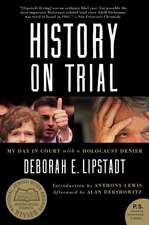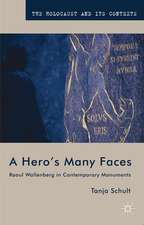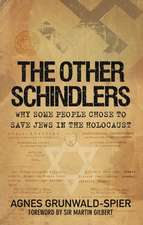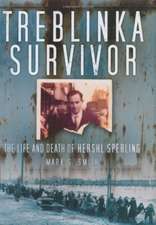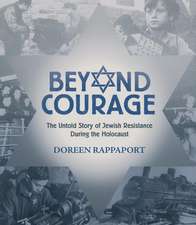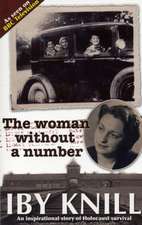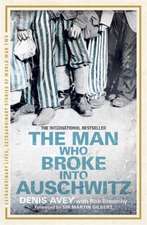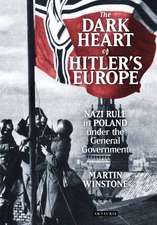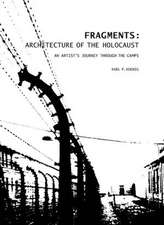Holocaust: An American Understanding: Key Words in Jewish Studies, cartea 7
Autor Deborah E. Lipstadten Limba Engleză Paperback – 21 iul 2016 – vârsta ani
Immediately after World War II, there was little discussion of the Holocaust, but today the word has grown into a potent political and moral symbol, recognized by all. In Holocaust: An American Understanding, renowned historian Deborah E. Lipstadt explores this striking evolution in Holocaust consciousness, revealing how a broad array of Americans—from students in middle schools to presidents of the United States—tried to make sense of this inexplicable disaster, and how they came to use the Holocaust as a lens to interpret their own history.
Lipstadt weaves a powerful narrative that touches on events as varied as the civil rights movement, Vietnam, Stonewall, and the women’s movement, as well as controversies over Bitburg, the Rwandan genocide, and the bombing of Kosovo. Drawing upon extensive research on politics, popular culture, student protests, religious debates and various strains of Zionist ideologies, Lipstadt traces how the Holocaust became integral to the fabric of American life. Even popular culture, including such films as Dr. Strangelove and such books as John Hershey’s The Wall, was influenced by and in turn influenced thinking about the Holocaust. Equally important, the book shows how Americans used the Holocaust to make sense of what was happening in the United States. Many Americans saw the civil rights movement in light of Nazi oppression, for example, while others feared that American soldiers in Vietnam were destroying a people identified by the government as the enemy.
Lipstadt demonstrates that the Holocaust became not just a tragedy to be understood but also a tool for interpreting America and its place in the world. Ultimately Holocaust: An American Understanding tells us as much about America in the years since the end of World War II as it does about the Holocaust itself.
| Toate formatele și edițiile | Preț | Express |
|---|---|---|
| Paperback (1) | 286.52 lei 6-8 săpt. | |
| Rutgers University Press – 21 iul 2016 | 286.52 lei 6-8 săpt. | |
| Hardback (1) | 820.67 lei 6-8 săpt. | |
| Rutgers University Press – 21 iul 2016 | 820.67 lei 6-8 săpt. |
Din seria Key Words in Jewish Studies
-
 Preț: 153.22 lei
Preț: 153.22 lei -
 Preț: 304.43 lei
Preț: 304.43 lei -
 Preț: 401.02 lei
Preț: 401.02 lei -
 Preț: 286.52 lei
Preț: 286.52 lei -
 Preț: 313.73 lei
Preț: 313.73 lei -
 Preț: 286.09 lei
Preț: 286.09 lei -
 Preț: 284.95 lei
Preț: 284.95 lei -
 Preț: 322.55 lei
Preț: 322.55 lei -
 Preț: 240.65 lei
Preț: 240.65 lei - 22%
 Preț: 214.90 lei
Preț: 214.90 lei
Preț: 286.52 lei
Nou
Puncte Express: 430
Preț estimativ în valută:
54.83€ • 56.92$ • 45.72£
54.83€ • 56.92$ • 45.72£
Carte tipărită la comandă
Livrare economică 22 martie-05 aprilie
Preluare comenzi: 021 569.72.76
Specificații
ISBN-13: 9780813564760
ISBN-10: 081356476X
Pagini: 220
Dimensiuni: 152 x 229 x 15 mm
Greutate: 0.32 kg
Ediția:None
Editura: Rutgers University Press
Colecția Rutgers University Press
Seria Key Words in Jewish Studies
ISBN-10: 081356476X
Pagini: 220
Dimensiuni: 152 x 229 x 15 mm
Greutate: 0.32 kg
Ediția:None
Editura: Rutgers University Press
Colecția Rutgers University Press
Seria Key Words in Jewish Studies
Notă biografică
DEBORAH E. LIPSTADT is the Dorot Professor of Modern Jewish History and Holocaust Studies at Emory University in Atlanta, Georgia. Her many books include Beyond Belief: The American Press and the Coming of the Holocaust, 1933-1945, History on Trial, and The Eichmann Trial.
Cuprins
Foreword by Andrew Bush, Deborah Dash Moore, and MacDonald Moore
Acknowledgments
Introduction
1 Terms of Debate
Finding a Name to Define a Horror
Laying the Foundation: The Visionary Role of Philip Friedman
Creating a Field of Study: Raul Hilberg
Survivors in America: An Uncomfortable Encounter
“Holocaust” in American Popular Culture, 1947–1962
2 State of the Question
The Eichmann Trial and the Arendt Debate
“Holocaust”: Shedding Light on America’s Shortcomings
A Post-Holocaust Protest Generation Creates Its Memories
The Baby Boom Protesters
From the Mideast to Moscow: Holocaust Redux?
Survivors: From DPs to Witnesses
Severed Alliances
The Holocaust and the Small Screen
America and the Holocaust: Playing the Blame Game
The White House: Whose Holocaust?
The Kremlin versus Wiesel: Identifying the Victims
3 In a New Key
Skewing the Numbers: Counting the Victims
An Obsession with the Holocaust? A Jewish Critique
The Bitburg Affair: The “Watergate of Symbolism”
Memory Booms as the World Forgets
Assaults on the Holocaust: Normalization, Denial, and Trivialization
The Uniqueness Battle
Impassioned Attacks
Competitive Genocides? The Holocaust versus All Others
Scaring the People: On How Not to Proceed
Notes
Index
Recenzii
"Lipstadt's Holocaust: An American Understanding fulfills its editors' request for a volume that 'decipher[s]' a key word in Jewish Studies and underscores 'the points of intersection between academic disciplines and wider spheres of culture.' And to my mind, it also succeeds as a mini-intellectual and social biography of a scholar and Jewish advocate who has become one of the most remarkable Jewish women of our time."
"Drawing on primary and secondary sources as well as interviews, Lipstadt’s book details the manner in which the Shoah moved from a little-understood, horrific casualty of WW II to its present impact on American culture, politics, and the US Jewish community ... Lipstadt’s exceptional book deserves to be in libraries as well as in colleges and universities that offer courses on the Holocaust and its aftermath ... Summing up: Essential. All levels/libraries."
"Deborah Lipstadt always writes smoothly and reasons vigorously. This book is lucid, accessible, and courageous - I couldn't put it down."
"[Holocaust] is very much an account of an American discourse on the Holocaust, and one in which Jewish voices take centre stage. For those on Jewish studies programmes in US universities, it will serve as a helpful introduction to the main trends since 1945."
"Offer[s] yet another revealing avenue into American understandings of the Holocaust."
Descriere
In Holocaust: An American Understanding, Deborah E. Lipstadt reveals how since the end of the war a broad array of Americans have tried to make sense of an inexplicable disaster, and how they came to use the Holocaust as a lens to interpret their own history. Drawing upon extensive research on politics, popular culture, student protests, religious debates and Zionist ideologies, Lipstadt weaves a powerful narrative that ranges from the civil rights movement and Vietnam, to the Rwandan genocide and the bombing of Kosovo.

